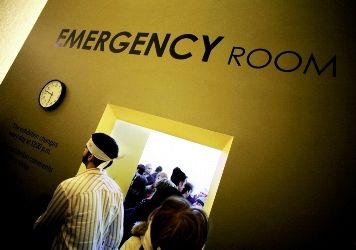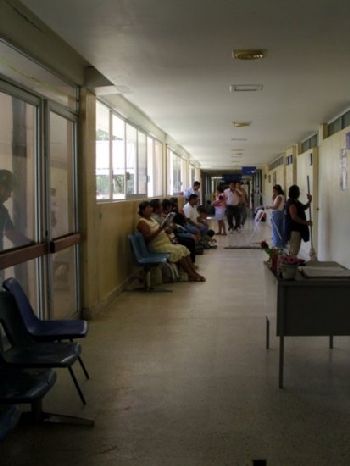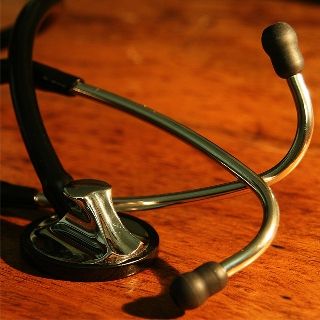
Publisher:
Bonnie King
CONTACT:
Newsroom@Salem-news.com
Advertising:
Adsales@Salem-news.com

~Truth~
~Justice~
~Peace~
TJP
Jan-10-2010 16:40

 TweetFollow @OregonNews
TweetFollow @OregonNews
Universal Healthcare's Only Competition is Profit
Wayne Pierce Salem-News.comAmericans must learn the truth and stand up for their rights.
 A hospital in Italy Courtesy: faculty.valenciacc.edu |
(EUGENE, Ore.) - We hear many debates about which country or countries provide the best healthcare systems. These discussions often become derailed and get bogged down in expressions of fear of what are perceived as the “socialist” ways of the European Countries.
The purpose of this article is not to argue the merits of capitalism vs socialism, especially since most countries are really made up of both.
The EU countries all have national healthcare plans; the US has a mediocre federal healthcare plan for seniors plus state and county healthcare plans for certain individuals who qualify. So, in my opinion, countries cannot be defined as “socialist” or “capitalist” simply based upon their healthcare systems.
Perhaps some readers can provide insight into these definitions. However, my purpose here is to discuss the merits of the practice of healthcare in the US Vs other countries. I can only speak in generalities, for in the healthcare business, many individuals are involved and humans do make mistakes.
Many of us have sought help from Emergency Hospitals for either ourselves, family members, or perhaps a friend. Unless one’s life is in immediate danger, the routine is about the same, which can be demonstrated by the following case I am familiar with.
 Courtesy: openpen.org |
A woman was with a friend when her friend began feeling light-headed, confused, and weak. She was losing her ability to walk. She took her friend home and put her to bed and stayed with her. When her friend started talking incoherently about bits and pieces from memories of her past, she became alarmed and decided to take her to the Emergency Hospital.
With difficulty, she got her dressed and into the car for the drive across town. People at Emergency helped her friend from the car into a wheelchair and they were ready for their first challenge, that of getting past the man at the entrance to whom she had to explain her friend’s symptoms and answer his questions.
This can be tough when we know someone we care about is having serious problems and we are losing time.
Once inside, they had to stop at a desk and provide the required personal and health insurance information to the business clerk. Then they were ready to sit and wait for someone to take her back to the exam area.
They remained in Emergency for several hours while doctors performed various tests, some of which turned out to be very expensive. A doctor finally came out to see her friend and told her they could not find anything wrong with her, so he was releasing her.
Three months after her visit to Emergency, the woman suffered a stroke due to a lack of blood supply to her brain.
A personal doctor determined that the blood supply to her brain was being cut off due to clogged carotid arteries, a very common problem that the doctors at the Emergency hospital had missed. This was inexcusable inasmuch as her symptoms would lead one to suspect such a cause, which can be detected by listening to the arteries with their stethoscope and, more accurately, performing ultrasound tests.
 New York's entrance of the Emergency Room at PS1 |
Their error might have resulted in much worse damage to this woman’s brain. Unfortunately, as is often the case, the Emergency doctors would never learn of their mistake.
I was watching part of the congressional debates about healthcare and became quite discouraged at the lack of honesty and distortion of the facts. In a true democracy, after the people elect their representatives, it is assumed that these representatives will resolve their differences and work together for the welfare and security of those they represent.
However, politicians in the US have gradually evolved into representatives and spokesmen for their corporate sponsors and lobbyists.
I sat listening to a Republican congressmen expounding upon the terrible socialist healthcare in Europe and Canada and how healthcare in America was best in the world, which he had to know was false. One congressman stood up and said that healthcare in Canada was so terrible that many Canadians had to come to the US for their healthcare.
It was quite obvious to me that this man was totally ignorant or, more likely, was a spokesman for the health insurance industry that cannot stand the idea of losing control of the healthcare in the US and the billions of dollars it provides them.
I have friends in Canada and have visited there many times. While there, I frequently have opportunities to talk with people about their national healthcare plan. The consensus seems to be that they are happy with their healthcare, especially since everyone is covered, and they can’t believe that American healthcare is so poor.
They especially cannot believe that so many Americans do not have any healthcare insurance.
Any Canadian citizen can see their doctor anytime they want at no charge. The concern some have is with the waiting period for procedures such as knee or hip replacement.
If it is not critical, they might have to wait for many months. Those who don’t want to wait and who can afford it do indeed seek help in the US. Because of the risk of infection and/or rejection of the implant, this might not be wise.
My sister once fell and injured her knee, which caused her problems for years. When knee replacement became commonplace, she inquired of a doctor if such an operation would relieve her problems.

Though in my opinion her health history would suggest she avoid such an operation unless absolutely necessary, she followed her doctor’s advice and underwent a knee replacement. Unfortunately, she developed an infection, which required very heavy doses of antibiotics administered via an IV.
After the infection continued to resist treatment for many months, the artificial knee had to be removed and replaced with a rod until the infection subsided. Sometime later, after the infection was cured, her doctor installed a new knee.
Though the surgery was a success, she again came down with an infection. After many more months in nursing facilities receiving IV antibiotics and taking pain medication, the knee had to be removed.
Her upper leg was fused to her lower leg and without the knee, she was left with a much shorter leg--that would not bend.
Though she had still been able to walk prior to these surgeries, the infections, antibiotics, and pain medications had kept her bedridden for a couple years before she died of liver failure, which I assume was caused by the infections and heavy medications. All surgeries have their risks and because of stories like these, it might be wise to not rush into any procedures unless absolutely necessary.
We can argue all day about what we think we know about the healthcare of other countries, but most of our information comes from special interest groups and dishonest politicians and there is really nothing better than experience.
I have always believed in national healthcare systems whereby our well being is not in the hands of corruptible large corporations and investors, but instead, in the hands of our representatives that we can throw out of office if they fail us.
However, I had no experience with such systems until my trip to Italy a few years ago. While on an extended visit there, I came down with what I thought was the flu, which evolved into the worst respiratory infection of my life.
It became so bad that I spent all day and night coughing and sometimes had difficulty breathing. My eyes became red and infected. During our stop to visit American friends in Verona, I was in pretty bad shape, so they took me to their Emergency Hospital.
As we headed across town to the hospital, I started thinking: I was a foreigner, my insurance was no good here, and I would I have to figure out how to raise the cash to pay them. Emergency hospital visits are were not cheap.

I thought about telling my friends that I would just tough it out, but I was becoming desperate. We arrived at a very old building whose appearance wasn’t up to the standard I expected. A good paint job would help, I thought to myself.
As we entered, there was no one at the door to convince I needed help in order to gain entrance. There were no clerks at desks requiring personal and insurance information for them to type into their computers. In fact, there were no computers.
There was one congenial looking man sitting in a booth who seemed to be in charge of checking people in and out. Most Italians speak at least some English and when he asked what was wrong, I patted my chest and explained my bad cough.
He did not have a computer and simply made some handwritten notes. He made a copy of my passport and told me to have a seat.
Within five minutes a friendly nurse in a real white nurse’s uniform called me into the exam room. She did not question me about my symptoms, but proceeded to take my vitals.
We were soon joined by a doctor who talked with me and examined me while the nurse drew blood for testing leaving an IV in case the doctor wanted to administer antibiotics, which is much more efficient than trying to get them past the stomach.
Their drawing of blood for lab testing surprised me. They were not just going to guess what was wrong and write a prescription. Being I was so ill, having a nurse and doctor in the room caring for me together was an experience I will never forget.
The sense of caring was something I had not experienced from doctors in many years. No clerks, no staring at computers and typing instead of paying attention to their patient, no one under pressure to rush in order to please the business manager and investors.
People were able to perform the work they were trained for, and heaven forbid, what they dedicated their life to. They were clearly healthcare professionals, unencumbered and stressed by the demands of the businessmen.
For the most part, doctors in the US work in business groups where they are required to be doctors and businessmen, creating a situation that can result only lead to terrible conflicts for them. The only thing worse would be if a doctor was also required to be an attorney.
The doctor made some handwritten notes and told the nurse to send me for x-rays of my respiratory system, again preferring testing rather than guessing. When he reviewed the x-rays, he told her to send me to the Pneumonia Clinic.
It was quite a hike across the large hospital, but when I got there, I was seen immediately by a nurse and doctor. No clerks and no computers. After the doctor talked with me and performed his examine, he made some handwritten notes, wrote a couple prescriptions, and sent me back to where I started.
I thought I was finished, but as I started to check out with the man in the waiting room booth that I had first talked with a couple hours earlier, he looked at me with great interest and asked me, "if I was OK."
I nearly melted and surprised myself when I told him that I wasn't OK. These people seemed to really care. He asked me if anyone had checked my eyes and when I told they had not, he called the nurse who had worked with me originally and told her to send me to the Ophthalmology Clinic and back across the hospital I went.
The doctor put my head in one of those devices that hold you still while they do their exam. He shined the bright light in my eye and let out an expression in Italian whose meaning I could only guess. Holy something or other. He then proceeded to flip back my eyelids, clean out my eye sockets and apply medication.
It sounds gruesome, but actually felt good. The doctor made some handwritten notes and wrote a couple prescriptions and sent me back to the waiting room.
The man in the booth called me up to see him and waited while he went through all the doctor notes, x-rays, and lab reports. When he was satisfied with the care I had received, he put it all together in an envelope, handed it to me. With a big smile, he said "Buon giorno."
I thanked him and we walked out.
As we left the hospital, I asked my friends why I hadn’t been charged for all the work they had done. After all, I had seen three doctors, had blood tests, and x-rays.
They told me that they are normally supposed to charge foreigners for healthcare, but due to the paperwork, the doctors feel it’s a waste of their time, so don’t bother.
It is obvious that, though they might work for the government, they are treated as professionals and are in charge of their own work.
They do not have “efficiency experts” defining their work for them, they are not managed by businessmen, and they do not have to submit to the demands of a computer system.
They are not plagued by worries about profits, but can focus on the patient and the practice of medicine, which they spent so many years training for. This does not mean that there are no government procedures and controls; but it does mean that the doctors’ work is most important.
All European Countries have had similar national healthcare programs for decades. The cost for such great healthcare, for every citizen of the country, is about half that of the US, while the quality is much higher. In all studies, Europeans are healthier and live longer than people in the US.
Most US citizens do not know that it was not always intended to be this way. At the end of World War II, European countries instituted government reforms intended to meet the people’s needs for security and a decent life.
One of these reforms was the implementation of universal healthcare.
After the war, President Franklin Delano Roosevelt aimed for a “Second Bill of Rights” for the American people. One of these “rights” was universal healthcare. He outlined his “Second bill of Rights” for a newsreel at the end of what would be his last State of the Union address in 1944.
However, certain powers made sure this part of his address was removed and the American people remained unaware.
These same powers prevented President Clinton from implementing universal healthcare and are currently fighting President Obama’s attempt to do likewise.
The only way we will have universal healthcare comparable to that of European Union countries is when Americans learn the truth and stand up for their rights.
===============================================
 Wayne was born in a small farm town in California's San Joaquin Valley. At age ten, he moved with his family to San Jose, California, which at the time had a population of 50,000 and was surrounded by orchards--mostly prunes. At age twenty, he joined IBM, one of the first electronic plants that would evolve into what we know today as Silicon Valley. Most of his college education was acquired through part-time classes while sometimes working ten hours a day. Wayne started on the bottom in the magnetic disk manufacturing facility, which produced the large disks for the earlier IBM computer systems. These magnetically coated disks would evolve into what we know today as hard drives. Wayne's last assignment with IBM was setting up their first inkjet printer lab that became what we know today as the Lexmark printer business. After his retirement from IBM, he wrote human interest stories for a small town newspaper.
Wayne was born in a small farm town in California's San Joaquin Valley. At age ten, he moved with his family to San Jose, California, which at the time had a population of 50,000 and was surrounded by orchards--mostly prunes. At age twenty, he joined IBM, one of the first electronic plants that would evolve into what we know today as Silicon Valley. Most of his college education was acquired through part-time classes while sometimes working ten hours a day. Wayne started on the bottom in the magnetic disk manufacturing facility, which produced the large disks for the earlier IBM computer systems. These magnetically coated disks would evolve into what we know today as hard drives. Wayne's last assignment with IBM was setting up their first inkjet printer lab that became what we know today as the Lexmark printer business. After his retirement from IBM, he wrote human interest stories for a small town newspaper.
You can write to Wayne Pierce at: bus215@aeolusblue.com
Articles for January 9, 2010 | Articles for January 10, 2010 | Articles for January 11, 2010
Salem-News.com:


googlec507860f6901db00.html
Quick Links
DINING
Willamette UniversityGoudy Commons Cafe
Dine on the Queen
Willamette Queen Sternwheeler
MUST SEE SALEM
Oregon Capitol ToursCapitol History Gateway
Willamette River Ride
Willamette Queen Sternwheeler
Historic Home Tours:
Deepwood Museum
The Bush House
Gaiety Hollow Garden
AUCTIONS - APPRAISALS
Auction Masters & AppraisalsCONSTRUCTION SERVICES
Roofing and ContractingSheridan, Ore.
ONLINE SHOPPING
Special Occasion DressesAdvertise with Salem-News
Contact:AdSales@Salem-News.com

Terms of Service | Privacy Policy
All comments and messages are approved by people and self promotional links or unacceptable comments are denied.
Natalie January 13, 2010 1:04 am (Pacific time)
Emergency room experience was a nightmare for me. My first mistake was not to call 911 but get there by myself. In between going blank I had to explain my symptoms to 4 different nurses. First, they didn't believe I had contractions, then they doubted when I said I vomited blood few times before getting to ER. Finally, everybody just left me alone in the room behind closed doors for 40 minutes. When I realize I was losing conscious, tried to reach the "Nurse" button, but it was too far and I couldn't move. Just started yelling and crying. Nobody came in for another 5 minutes. But my story somewhat balanced. I had the best nurses in the labor dep. itself. They knew me, since I had a very complicated pregnancy and really cared for me like family. After all, I had a beautiful healthy baby and that makes me forget my experience at ER. But if I ever again need to go to ER, I'm calling 911 and not going there by myself.
Darlene of Vanc. Wa. January 11, 2010 4:36 pm (Pacific time)
Very well written.. Received alot of good information. Thanks for sharing...
Amanda January 11, 2010 1:06 am (Pacific time)
A very good and informative article. I wonder how many people will comment, or even let the fact, that the U.S. Citizen has the FREEDOM to suffer or die, because profit first, healthcare later. After all, we are a "different species" they tell us, who prefer no healthcare coverage, rather than socialized medicine like all Eureopean Countries enjoy. Watch Moore's C-D Rom on Healthcare = No laughing, matter, but a sad reality.
joneboze January 10, 2010 8:48 pm (Pacific time)
Join the conversation about the Obama Health care plan at www.obamahealthcareplan.org
joneboze January 10, 2010 8:46 pm (Pacific time)
Do you support the new Health care plan? express your opinion at http://www.obamahealthcareplan.org
[Return to Top]©2026 Salem-News.com. All opinions expressed in this article are those of the author and do not necessarily reflect those of Salem-News.com.